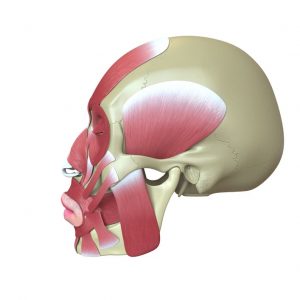TMJ FAQs | San Diego TMJ Treatment
I have headaches frequently. Is this related to possible TMJ problems?
 Of course, a thorough examination would be necessary to cover this question accurately. However, if Dr. George sees that you have worn teeth from grinding this may be a clue. Clenching or grinding is also called bruxism, and can create muscle tension, and muscle spasms, which then creates pressure on the blood vessels in the head and inflammation in the TMJ (joint). Inflammation in the TMJ can refer pain to your head, eye, neck, shoulders, and ears.
Of course, a thorough examination would be necessary to cover this question accurately. However, if Dr. George sees that you have worn teeth from grinding this may be a clue. Clenching or grinding is also called bruxism, and can create muscle tension, and muscle spasms, which then creates pressure on the blood vessels in the head and inflammation in the TMJ (joint). Inflammation in the TMJ can refer pain to your head, eye, neck, shoulders, and ears.
Sometimes my TMJ pops and clicks when I open my mouth. Is this a concern?
As a general policy Dr. George does not treat for joint noise unless it is associated with TMJ pain or discomfort. 80% of the public experiences some TMJ noise in their life. If your joint locks in an open or closed position this is more dangerous and should have TMJ treatment.
How long do I have to wear my TMJ splint?
Dr. George looks for some improvement within 1-3 months. If your TMJ condition began many years ago then it may take longer than if TMJ symptoms developed more recently. Initially, Dr. George checks his patients TMJ splint every week until he sees some improvement, then every two weeks. Physical therapy or massage should be done 1 or 2 times per week.
What are some of the causes of TMJ pain?
- The most common problem is psychological stress which leads to clenching, muscle tension, and joint inflammation.
- Another cause is physical trauma such as a direct impact to the lower jaw or whiplash. Whiplash is often experienced from sports or car accidents, where the head moves in a rapid direction and the lower jaw snaps downward and stretches the TMJ ligaments.
- Another cause of TMJ pain can be a result of lower teeth extractions, especially 3rd molars or wisdom teeth. Dr. George has treated many patients who have received several anesthesia or IV sedation and developed TMJ pain. Under anesthesia the patient has no awareness of how much torque the doctor is exerting on their joint when the tooth is being leveraged out of the jaw. Even with local anesthesia, any extraction on the lower jaw must be done carefully and with complete respect for the delicate nature of TMJ.
- If you have had adult (bicuspid extractions) then you may experience TMJ pain. If the orthodontist angles your front teeth excessively inward to close the space created from the extractions, this can cause a posturing of your lower jaw in an unhealthy position in your TMJ space.
TMJ FAQs San Diego | Make Your Appointment Today
If you have any questions about your TMJ pain please schedule a consultation appointment with Dr. George as soon as possible.
Come visit our office and find out more about our special TMJ treatment, conveniently located at University Town Center in La Jolla. You can contact us, or just call (858) 552-1223.
